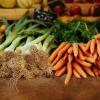News
Displaying Results 1 - 25 of 41
Representatives from countries across Central Asia and experts on the climate and clean air came together in Astana, Kazakhstan this week (11-13 June 2024) for the Sub-Regional Workshop on Integrated Planning for Climate and Air organized by the UNEP-convened Climate and Clean Air Coalition (CCAC)…
Central Asia is well placed to produce fresh and dried fruit and vegetables. Countries like Kyrgyzstan, Tajikistan, and Uzbekistan are important producers of dried fruit, in particular apricots. However, traders from the region have been facing challenges with diversifying their export portfolios…
In an important move to secure the supply of essential raw materials, the European Critical Raw Materials Act (CRMA) entered into force on 23 May 2024. This legislation is a cornerstone in enhancing the EU's capabilities in sourcing, processing, and recycling critical raw materials (CRMs), which…
In the face of global crises, progressing towards Sustainable Development Goal (SDG) 16—promoting peaceful, inclusive societies, justice for all, and accountable institutions—is a cross-cutting enabler for the 2030 Agenda. SDG16 intertwines with the other SDGs, underscoring the importance of…
The Fourth Cycle of UNECE Environmental Performance Reviews (EPR) is underway with the fourth review of Montenegro, carried out under the leadership of UNECE.
A large, multidisciplinary team of international experts worked in Podgorica from 22 to 30 April 2024, assessing the environmental…
The Sustainable Development Goals (SDGs) require a massive transformation of our economies and societies, and a shift towards more sustainable patterns of production and consumption. Public-Private Partnerships (PPPs) are a powerful tool to support this transformation, as they can mobilise private…
Infrastructure is crucial for social and economic development. To achieve the 2030 Agenda for Sustainable Development, infrastructure needs to be green, climate resilient, circular, inclusive and fiscally sustainable, with people as the main beneficiaries. Infrastructure is also needed to rebuild…
In the UNECE region, the Fourth Cycle of Environmental Performance Reviews (EPR) kicks off with the review of Tajikistan, carried out for the fourth time under the leadership of UNECE.
A large, multidisciplinary team of international experts worked in Dushanbe from 6 to 15 November 2023,…
The European Commission has proposed a new legislation, the European Critical Raw Materials Act, to ensure a secure and sustainable supply of critical raw materials for the EU. The Act, on which the European Parliament and the European Council reached a provisional agreement on 13 November,…
For some time now, Uzbekistan has been engaged in various activities under the UNECE Convention on Access to Information, Public Participation in Decision-making and Access to Justice in Environmental Matters (Aarhus Convention).
An international round table entitled “Aarhus Convention: Effective…
As the global economy emerges from the COVID-19 pandemic and governments strengthen efforts to “build-back-better”, trade as an engine of growth has re-emerged in policy agendas. For developing countries and countries with economies in transition that are still in the process of accession to the…
Adopted in 1963, the UNECE Standard S-1 concerning the certification and commercial quality control of seed potatoes provides a framework for the international trade of seed potatoes. It is currently the only international standard that ensures that seed potatoes meet specific and harmonized…
While Uzbekistan has improved its environmental performance in line with the Sustainable Development Goals (SDGs) related to water and sanitation (SDG 6) and forests and tree cover loss (SDG targets 15.1, 15.2, 15.3), significant challenges remain related to air quality (SDG 11.6), water resources…
A dilemma has galvanised the Public-Private Partnerships (PPPs) and infrastructure community for some time: How to ensure the bankability of pipelines of sustainable projects in emerging economies. PPP lenders and debt-providers continue to argue that there are not enough bankable projects to…
In the face of rising prices of food and energy, and the persistence of the climate crisis, the sustainability of food systems is an issue of increasing global attention. While meat production provides an essential source of nutrition, and an important source of income for farmers, its impact on…
The extreme heat and drought that the region experienced this summer is a bleak reminder that current commitments under the Paris Agreement and those made last year at COP26 are nowhere near what is needed to limit global warming to below 1.5°C. Inaction is a policy choice that will lead to greater…
As the sun sets in northern México, less than 100 kilometres from its border with the United States, news from the latest coal mining disaster near Sabinas, in the state of Coahuila, is heartbreaking for the families awaiting at the surface. Military divers who have bravely attempted to make their…
July is a month to start enjoying the harvest of fruits and vegetables for many in Europe and the topic of reducing food loss and waste becomes very urgent. In Serbia, agriculture is an important sector of the economy, contributing around 6% of GDP. In March 2022 food production accounted for 10.4…
Regional seas and coastal ecosystems, located either entirely or partly within the UNECE region, face growing environmental pressures caused by climate change, the increasing pollution loads, tourism, fishing, mining of minerals, and energy production (such as offshore wind power plants). These…
A large, multidisciplinary team of international experts under the leadership of UNECE is working in Bishkek, assessing the environmental performance of the country by examining developments during the past decade.
The third review of Kyrgyzstan measures progress made and considers challenges…
The transition to a decarbonized energy sector is a critical step for keeping global warming below 2°C. To succeed, countries will need to phase out, or at least substantially limit the use of coal. While the benefits of the green transition are numerous, it will require a deep structural shift…
We probably all know what a potato is and how we prefer to eat it. But do you know what a seed potato is, and why seed potato certification matters? And did you know UNECE has a standard for seed potatoes?
Potatoes is one of the easiest vegetables to grow, as old potatoes that have grown buds can…
The second Environmental Performance Review (EPR) of Armenia kicks off in Yerevan under the lead of UNECE and carried out by a large, multidisciplinary team of international experts. This is the 56th EPR since the establishment of the UNECE EPR Programme over a quarter of a century ago. Armenia has…
In light of the global focus on decarbonization, which is critical to achieve the goal of keeping global warming below 2°C compared to pre-industrial levels, the energy sector must undergo profound modernization, with a focus on phasing down unabated coal extraction and use. However, to meet…
Embracing sustainable infrastructure that is green, circular, inclusive, resilient and fiscally sustainable, is necessary to stay on track to achieve the Sustainable Development Goals (SDGs) by 2030.
The UNECE People-first PPP Evaluation Methodology for the SDGs can support Governments in this…


























